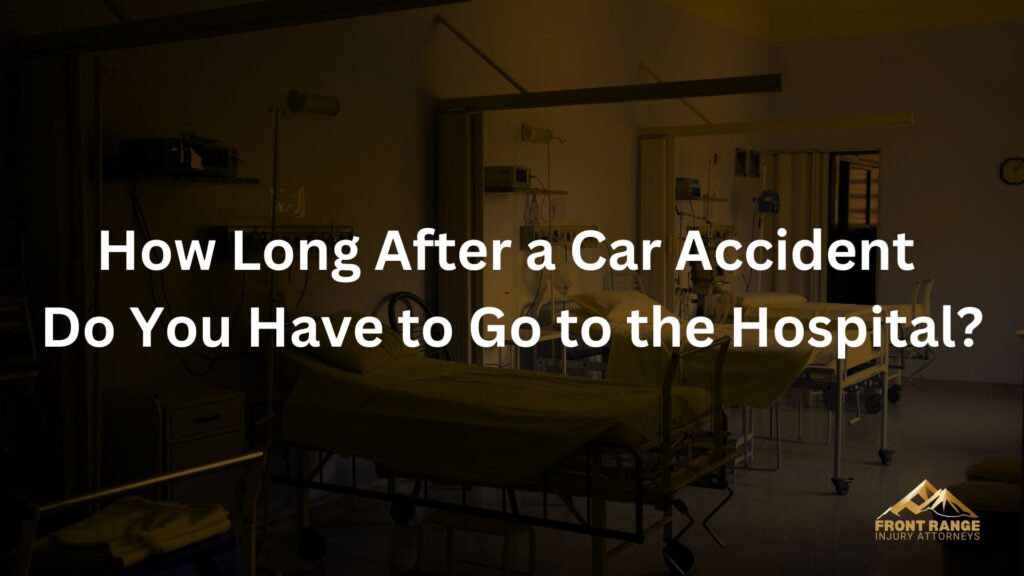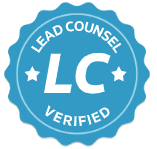In the aftermath of a car accident, the timing of seeking medical care plays a crucial role in safeguarding your health and legal rights. While there’s no set timeframe stipulated, prompt attention to potential injuries is paramount. Every case is unique with its own circumstances and injuries that determine whether you need emergency treatment or an appointment with a physician can wait. It is generally best to seek medical attention as soon as possible if you’ve been in a car accident to protect your physical health and your legal rights.
If you sustained injuries in an accident in Colorado, contact the personal injury lawyers at Front Range Injury Attorneys today to schedule your free consultation. Our experienced legal team are knowledgeable and zealous advocates for our clients and their cases. We treat our clients as people, not case files. Learn more about how we can help you pursue compensation for your injuries and damages. Contact our Denver law firm to learn more.

Determining Immediate Medical Needs
If you’re in a car accident in Denver and experience immediate signs of injury, head straight to the hospital from the crash site. Signs of injury can include pain, swelling, bleeding, or signs of fractures. In case of emergency, dial 911 (or ask someone to do so) and request an ambulance to transport you to the nearest emergency room. Otherwise, have someone drive you to the nearest hospital for a prompt check-up.
Urgent Symptoms Requiring Immediate Attention
- Severe Injuries: Any evident injuries demanding urgent care.
- Bleeding or Bruising: Indications of internal or external trauma.
- Pain or Discomfort: Any discomfort suggestive of underlying injuries.
- Spinal or Neck Pain: Symptoms indicative of potential spine-related injuries.
- Abdominal Pain: A potential sign of internal injuries.
- Numbness or Tingling: Sensations suggesting nerve damage.
- Headache or Dizziness: Symptoms possibly related to head trauma.
- Loss of Consciousness: Even momentary loss of consciousness necessitates immediate evaluation.
If you or anyone involved in the accident, including passengers or the other driver, shows any of these signs, it’s crucial to head to the hospital immediately. You might be dealing with a life-threatening or catastrophic injury like internal bleeding, spinal cord damage, or a traumatic brain injury. Swift medical attention can offer the necessary emergency care to minimize health complications or even save lives.
Early Intervention and Legal Implications
Delaying your visit to the hospital after a crash could worsen the injuries you sustained. For instance, if you have a back injury and don’t seek immediate medical attention, any sudden movements could lead to serious consequences like paralysis.
However, seeking early medical attention at a hospital allows professionals to assess and treat any injuries promptly. Hospitals are well-equipped to handle common car crash injuries, ensuring thorough care.
Timely medical attention also helps in evaluating your car insurance claim. As a claimant, it’s your responsibility to minimize damages. Insurance companies may scrutinize whether you sought immediate care or delayed treatment. Delaying treatment could give them grounds to deny or reduce your claim benefits.
Recognition of Delayed Injuries
It’s strongly recommended that anyone involved in a car accident promptly visit the nearest hospital or see their doctor for a medical evaluation, even if they initially feel uninjured. Through a physical examination and medical tests like scans and x-rays, injuries can be detected before symptoms manifest. It’s more common than often realized to have delayed or hidden injuries after car accidents.
While one might assume that all serious injuries would be immediately evident, this isn’t always the case. Many injuries, including life-threatening ones, might not show symptoms until hours or days after the crash. Examples include brain injuries, whiplash, back and spine injuries, herniated disks, and internal injuries. If you experience any delayed symptoms following a crash, such as pain, headaches, stiffness, or confusion, seek medical attention promptly.
The risk of delayed injuries underscores the importance of seeking immediate medical care after a car accident. When communicating with the other driver, law enforcement, or insurance companies involved in your crash, refrain from stating that you are uninjured until you’ve been examined by a doctor. Claiming no injuries at the scene could complicate efforts to obtain financial compensation if injuries are discovered later on.
Statute of limitations for car accidents in colorado
While it’s advisable to seek medical attention promptly following a car accident, you technically have until Colorado’s statute of limitations expires to do so for the purpose of filing an injury claim. This statute imposes a strict time limit on initiating a personal injury claim.
In Colorado, the statute of limitations is typically two years from the date of the car accident or from when the injury was reasonably discovered, whichever is later. However, if you intend to file a claim against a government entity, the window is reduced to 180 days. These timeframes represent the maximum limits within which you must seek hospital treatment to document your injuries resulting from the crash.
Can I still recover compensation if I didn’t go to the hospital after my car accident?
Certainly, it’s still possible to pursue financial compensation following a car accident in Colorado even if you didn’t seek immediate medical attention. However, delaying medical care can complicate the compensation process. Insurance companies, driven by profit, may seek ways to reduce or deny your claim, including using your delayed hospital visit against you.
To safeguard your interests during the claims procedure, it’s essential to visit a doctor, even if some time has passed since the accident. If you experience any signs of injury, inform your doctor about the car crash and request copies of your medical records. Without medical documentation confirming your injuries from the accident, an insurance company might reject your claim.
Legal Assistance for Car Accident Cases
Engaging a proficient personal injury attorney following a car accident is advisable. Denver personal injury lawyers can offer invaluable guidance, aiding in navigating insurance claims and advocating for fair compensation. In summary, prioritizing timely hospital visits after a car accident is pivotal for both immediate health concerns and long-term legal ramifications. Seeking prompt medical attention not only ensures proper care but also strengthens the foundation for potential compensation claims.
Colorado Car Accident Lawyers
If you suffered injuries in an auto accident caused by someone else’s negligence, you may be entitled to compensation for your injuries, medical bills, lost wages and other damages. Our experienced Colorado car accident lawyers help clients across the state pursue full and fair compensation for their accident-related injuries and financial losses. We help clients in Colorado with a wide range of motor vehicle collisions involving different types of vehicles, crashes and severity of impacts. Contact our law firm to discuss:
- Car accidents
- Distracted driver accidents
- Drunk driver collisions
- Head-on collisions
- Hit and run accidents
- Light rail crashes
- Autonomous vehicle collisions
- Limo accidents
- Rear-end accidents
- Rideshare collisions
- Road construction accidents
- RTD bus crashes
- School bus accidents
- Scooter accidents
- Taxi crashes
Although most of our motor vehicle collision clients hail from Denver, we also help clients in other parts of Colorado, including:
- Arvada car accidents
- Aurora car accidents
- Boulder car accidents
- Centennial auto crashes
- Colorado Springs auto accidents
- Colorado Springs drunk driving crashes
- Colorado Springs head-on collisions
- Colorado Springs military vehicle accidents
- Colorado Springs rear-end collisions
- Colorado Springs rideshare accidents
- Colorado Springs school bus accidents
- Fort Collins car accidents
- Greeley car accidents
- Highlands Ranch auto crashes
- Lakewood bus accidents
- Lakewood car accidents
- Lakewood distracted driver collisions
- Lakewood drunk driving accidents
- Lakewood hit and run crashes
- Lakewood rideshare collisions
- Littleton motor vehicle collisions
- Longmont car accidents
- Parker car accidents
- Pueblo car accidents
- Thornton car accidents
- Westminster auto collisions
No matter the type of auto accident or location in Colorado, our law firm is ready to talk to you about your case. Front Range Injury Attorneys offers free consultations for car crash cases so you can speak with our experienced personal injury lawyers at no cost and no obligation.










